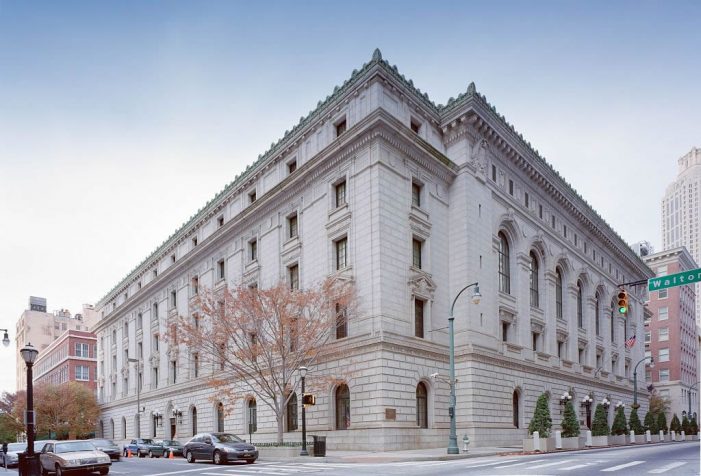By Jim Saunders, The News Service of Florida
TALLAHASSEE — Gov. Ron DeSantis’ administration contends the state is “threatened with irreparable harm” if a federal judge’s ruling is upheld.
But attorneys for felons who want voting rights restored say the state’s position seeks to undermine a “bedrock constitutional principle.”
More than a year after Floridians approved a constitutional amendment aimed at restoring voting rights of felons who have fulfilled their sentences, a fierce battle about how to carry out the amendment will land Tuesday at a federal appeals court in Atlanta.
The 11th U.S. Circuit Court of Appeals will hear arguments about whether felons who can’t pay legal financial obligations, such as restitution, fines and fees, should be able to have their rights restored. DeSantis’ administration appealed after U.S. District Judge Robert Hinkle in October issued a preliminary injunction and found that plaintiffs in the case cannot be denied the right to vote if they are “genuinely unable” to pay financial obligations.
The fight is rooted in the wording of the 2018 constitutional amendment, which restored voting rights to felons “who have completed all terms of their sentence, including parole or probation,” excluding people “convicted of murder or a felony sexual offense.”
Republican lawmakers passed a measure during the 2019 legislative session to carry out the amendment, including requiring felons to pay “legal financial obligations” to get their rights restored. That bill, signed into law by DeSantis, touched off federal court challenges as voting-rights and civil-rights groups said it would prevent many felons from having their rights restored — likening it to a “poll tax” from the Jim Crow era.
Hinkle did not toss out the law but tailored the injunction to 17 plaintiffs and said the state “cannot deny an individual
plaintiff the right to vote just because the plaintiff lacks the financial resources to pay whatever financial obligations Amendment 4 and SB7066 (the 2019 law) require the plaintiff to pay.”
In briefs filed at the appeals court, both sides described high stakes, including if Hinkle’s rationale would ultimately be applied to the broader pool of felons hoping to have voting rights restored.
In a Dec. 13 brief, attorneys for the DeSantis administration said the appellate ruling will “have far-reaching effects, as it will determine whether the state must comply with the court’s injunction in upcoming elections of national, state, and local significance in 2020.” Also, they argued that the 2019 law properly carried out the amendment.
“(The) state is the party threatened with irreparable harm, as the district court’s injunction at once contravenes the judgment of the people of Florida about what should be required of felons to be allowed to vote and re-enfranchises felons who are ineligible to vote under Florida’s Constitution,” the brief said.
But a brief filed this month for one group of plaintiffs by the Washington-based Campaign Legal Center argued that the state’s appeal “seeks to undermine the bedrock constitutional principle that the right to vote cannot be denied on the basis of wealth.”
Briefs filed on behalf of plaintiffs also contended that most felons are unable to pay financial obligations after being released from prison and, as a result, would not be able to get voting rights restored under the 2019 law.
“SB7066’s disenfranchising impact is massive,” said a brief filed by attorneys from groups and firms such as the ACLU Foundation, the NAACP Legal Defense and Educational Fund and the Brennan Center for Justice at the New York University School of Law. “Florida has acknowledged that most criminal defendants are indigent, and that Florida courts have ‘minimal collections expectations’ for over 85% of fines and fees.”
Amid the appeal, Hinkle last month issued an order that allowed registering the felons who assert they are unable to pay the financial obligations. But he blocked the felons from voting, at least temporarily.
If the appeals court upholds his injunction, the plaintiffs will “be in a position to vote on a showing of genuine inability to pay,” Hinkle wrote. If the appeals court strikes down the injunction, the plaintiffs won’t be allowed to vote and will be removed from the voting rolls.
“Allowing a plaintiff to register, without more, will not cause irreparable harm to anyone. If it turns out the preliminary injunction was wrong, the supervisors and the secretary (of state) will have suffered an administrative burden, but not much of one, and in any event, this is not irreparable harm,” Hinkle wrote.


Why is everyone being so respectful to Judge Hinkle when everyone knows he’s nothing but a leftist twit who pretends to be a blowhard but rules for any and all things leftist at the end of each trial.
You do know Hinkle will be rulling on our own usual suspect FBI sting results dont you?
This will be so annoying to local folks upset with our usual suspect miss deeds when it becomes apparent the FBI and “The Judge” had colluded to let Gillum off the hook from the begining of the investigation.
And like this “Felon’s” rulling all anyone will be able to do is $itch and moan as Gillum smirks for the press and walks out of Judge Hinkle’s court.
There ought to be a law against this Judge.
restoring voting rights of felons who have fulfilled their sentences………………… if any Payments, weather it be Court Costs, Restitution, what ever, if it was handed down as part of the Sentence, then YES, THAT TOO should be completed before Voting Rights are restored. WHY is so much energy being put into this when such a very small percentage of Minorities even VOTE? Look at the Numbers on who the Voters are. ALSO, Every Voter SHOULD be a LEGAL US Citizen (with Proof) and SHOULD have to present a Government Issues Photo ID at time of Voting. Anyone caught Voting more than once in a single Election should receive a MINIMUM of TWO YEARS in Prison. NO ID, NO VOTE.